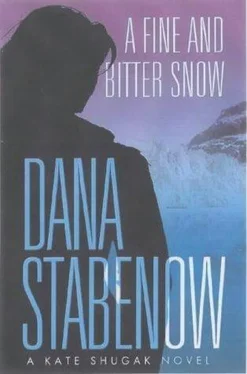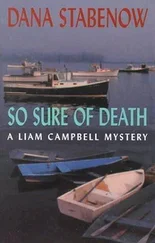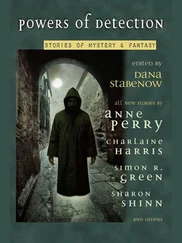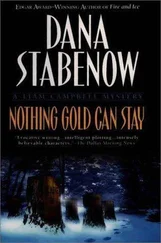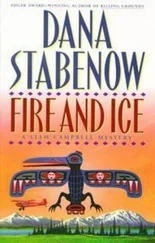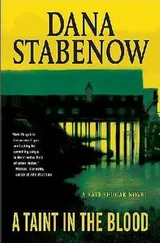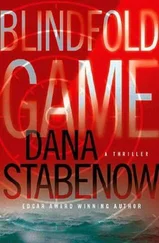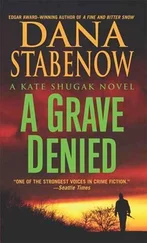“Private paperwork.”
“What kind?”
He looked down at her, mostly because he was almost two feet taller than she was. “Did you know Dina had been married?”
Kate choked on a mouthful of macaroni and cheese. She coughed, then coughed again. She was making so much noise, she was interfering with the current speaker, Bernie, who was telling the tale of Dina teaching him how to make a bean drink. “Dina insisted on celery salt,” he was saying, “and you had to pour a little of the water from the jar of pickled beans into the glass, too. The only trouble was that she was usually half in the bag by the time she developed an ambition to come around to my side of the bar, and she used about a half a fifth of Absolut while she was at it, which meant there wasn’t a whole hell of a lot of room left for the bean juice. So she’d drink off the vodka. And then, of course, she’d have to top off the drink.” He paused, then added, “She was without a doubt the worst bartender I’ve ever not employed.”
Kate took the same side door she’d led Pete through. Once outside, she coughed some more and then sneezed violently twice in succession. Her eyes were tearing when finally, wheezing, she said, “What?”
“I guess you didn’t,” Jim said, handing her a napkin. She mopped her tears and blew her nose. “I found a marriage certificate. You’ll never guess who to.”
She looked at him.
“John Letourneau.”
She gaped at him.
He nodded. “Yeah.”
“But I thought-Ruthe and Dina-”
“Yeah,” he repeated. “So thought we all.”
She remembered, and her eyes narrowed in a way that was reminiscent enough to put him on alert. “But you-”
“Yeah.” He refused to apologize. He and Ruthe had been consenting adults. Further, he refused to kiss and tell. “I was new to the Park. I didn’t hear they were a couple until after. She never said. There’s something else.”
Kate couldn’t begin to imagine what else. “What, Dina owned stock in Exxon?” It was about as believable. She remembered the two beds in Ruthe and Dina’s loft. But they were in their seventies. A lot of older couples chose to sleep alone, sometimes even in separate bedrooms.
He laughed. “No, nothing that bad.” He sobered. “Kate, I’m wondering about Higgins.”
“The guy you caught with the murder weapon in his hand?”
“I know,” he said, “I know. I’ve got him locked up in Tok. Would you fly up with me and talk to him, tell me what you think?”
Kate was taken aback. “You’re asking me for a consultation on a closed case?”
“Maybe it isn’t closed.”
“Oh, let me guess. He says he didn’t do it.”
“He says he doesn’t know, but, since I caught him with the knife, he figures he probably did.”
“How original.”
“The Carbondale chief sent me his sheet. There’s no history of violence, none, not ever.”
“What about his war record? His time in Vietnam?”
He shook his head. “None that they caught him at.” “Just talk to him,” Jim said. “I’d like to have your opinion.” He paused. “Please.”
The “Please” unnerved her, knocked her off balance. She opened the door and peered inside.
Pete was at the mike, talking about the time Dina lobbied the Juneau legislature to pass the permanent-fund dividend. “The woman never bought a drink,” he was saying; “she thought that’s what legislators were for.”
But the potlatch was winding down. Christie was sitting on the edge of the stage, holding court. Kate didn’t see Dan. A line had already formed in the cafeteria kitchen to wash the dishes, people were shrugging into coats, stamping into boots, and rounding up children, and the drummers had packed up. She could make sure Johnny didn’t go home without escort, ask Auntie Vi to oversee the cleanup. Avoid Ethan.
“I’ll get my coat,” she said.
It was snowing still, but visibility was good and the flight was quick. That was fine with Kate. It wasn’t that she was nervous at rubbing elbows with him for a hundred miles, she assured herself, it was the close quarters with a man who, when you came right down to it, she barely knew. Whom she barely knew enough to bean with a lockbox. Whom she didn’t know anywhere well enough to sleep with.
I am losing my mind, she thought.
Halfway to Tok, he broke the increasingly heavy silence. “I don’t suppose this could qualify as our first date?”
Kate didn’t reply, and she was out of the Cessna the moment it rolled to a halt on the Tok airstrip. She helped him push it into its parking space, keeping on the opposite side of the fuselage he was on. The journey to the post was accomplished in silence.
Higgins was curled up on the bed of the cell. He looked cleaner and certainly smelled better than he had the last time Jim had seen him. It was always amazing, the difference a shower and a couple of meals made in a suspect. Jim remembered a conversation he’d had with a woman he had dated a while back who had taught remedial English to guests of the state going for their GEDs. “I read about the horrible things they do in the papers, and then I meet them and they seem so nice, so polite,” she’d told him. “They don’t seem like monsters. Why are they so different once they’re in prison?”
“For one thing, they’re sober,” he’d told her.
But Higgins hadn’t been drunk, or high, the day he’d killed Dina, the day he’d put Ruthe in the hospital. His tox screen had come back clean as a whistle.
Higgins rolled over to look at them when Jim called his name, then rolled right back again. “Come on, Riley,” Jim said. “Sit up, would you? I’ve got someone here I’d like you to meet.”
“Does he have an attorney?” Kate said in a low voice.
“Hasn’t asked for one.”
She raised an eyebrow. They both knew from bitter experience that a perp without an attorney was a confession just waiting to be kicked. Defense attorneys were as much witness to due process as they were advocate for the accused.
“I know,” Jim said, “but I can’t force one on him.” He raised his voice. “Riley?”
Kate silenced him with an upraised hand. She pointed to the door. Jim frowned and shook his head. She kept pointing. He sighed, handed her the key, and stepped into the hall. He left Mutt behind, though.
“Mr. Higgins.” Kate kept her voice low and calm. “May I please come in?”
The novelty of being asked permission to enter his jail cell did not fail to have an effect. Higgins rolled to a sitting position and looked at her with anxious eyes. “Do I know you?”
“No, sir, we haven’t met. My name is Kate Shugak.” She let her hand rest on Mutt’s head. “This is Mutt.”
He met Mutt’s yellow stare and smiled. “What a beautiful dog.” He reached a hand through the bars. Kate tensed and almost warned him, and then his hand was scratching Mutt between the ears and the big gray half wolf was leaning into it.
There was a dead silence. Kate pulled herself together enough to say, “May I come in, Mr. Higgins?”
“The door’s locked,” he said apologetically, as if she wouldn’t know that, and as if he were committing some dreadful social solecism by confessing to it.
“I have a key. May I?”
“Oh. Certainly.” He rose to his feet as she entered, Mutt padding at her side. There was a chair opposite the bunk, next to the sink. The jail kept its cells clean, but there were some smells you can never scrub away, and human vomit, urine, and excrement were three of the most pervasive. Kate sat down in the chair. Higgins waited until she was seated before sitting on the bunk. He had awfully good manners for a murderer.
His dark hair was thinning and cut to above his ears, his face gaunt, lined, and freshly shaven. His hands, clasped in front of him, were large-knuckled and scarred. He was so thin, his body was little more than a layer of skin over bone. He was probably fifty, fifty-five. He looked a hundred.
Читать дальше
